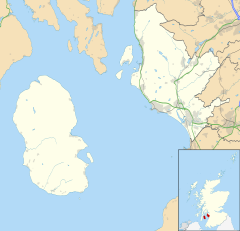Irvine, Scotland
Irvine
|
|
|---|---|
 From top to bottom: Irvine Harbour, Irvine Main Street, River Irvine with Irvine Skyline High Rise and Irvine Skyline with Irvine Harbour and River Irvine in foreground |
|
| Irvine shown within North Ayrshire | |
| Population | 33,698 |
| OS grid reference | NS325395 |
| • Edinburgh | 77.7 mi |
| • London | 430.9 mi |
| Council area | |
| Lieutenancy area | |
| Country | Scotland |
| Sovereign state | United Kingdom |
| Post town | IRVINE |
| Postcode district | KA11 - KA12 |
| Dialling code | 01294 |
| Police | Scottish |
| Fire | Scottish |
| Ambulance | Scottish |
| EU Parliament | Scotland |
| UK Parliament | |
| Scottish Parliament | |
Irvine (pronounced /ˈɜːrvᵻn/ IR-vin; Scots: Irvin,Scottish Gaelic: Irbhinn) is an ancient settlement, in medieval times a royal burgh, and now a new town on the coast of the Firth of Clyde in North Ayrshire, Scotland. The 2011 Census recorded the town's population at 33,698 inhabitants, making it the biggest settlement in North Ayrshire.
Irvine was the site of Scotland's 12th century Military Capital and former headquarters of the Lord High Constable of Scotland, Hugh de Morville. It also served as the Capital of Cunninghame and was, at the time of David I, Robert II and Robert III one of the earliest capitals of Scotland.
The town was once a haunt of Robert Burns, after whom two streets in the town are named: Burns Street and Burns Crescent. He is known to have worked in a flax mill on the Glasgow Vennel. Despite being classed as a new town, Irvine has had a long history stretching back many centuries and was classed as a Royal Burgh. There are also conflicting rumours that Mary, Queen of Scots stayed briefly at Seagate Castle. To this day there is still a yearly festival, called Marymass, held in the town.
...
Wikipedia

